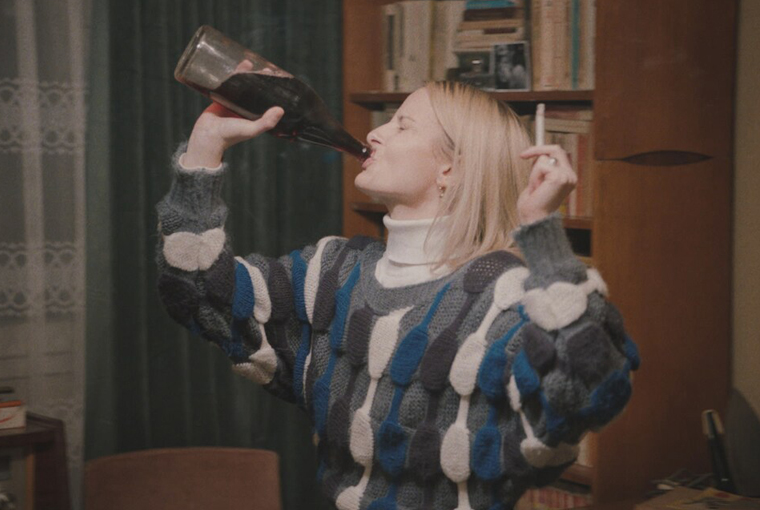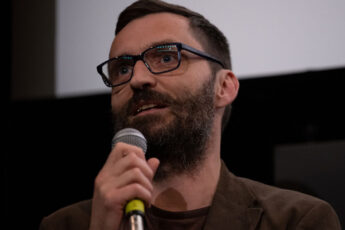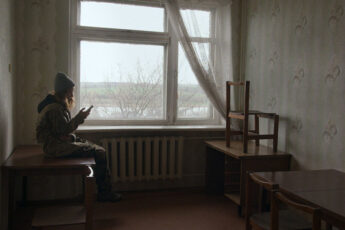“God Didn’t Save His Churches Let Alone My House.”
Bogdan Mureșanu’s The New Year that Never Came (Anul Nou care n-a fost, 2024)
Vol. 150 (December 2024) by Jack Page
Set during the wintry eve of the Bucharest riots in December 1989, TV producer Stefan has the impossible task of reshooting a New Year’s celebration special after his leading lady defects the Communist party and absconds from the country. Florina, a local actress from an amateur theater group, is cast as the infamous Lili due to their striking resemblance. Meanwhile, family man Gelu helps his neighbors move into government-appointed flats before their homes are demolished. These three subplots will weave in and out the main narrative together with the story of Stefan’s absent son who is captured by the Secret Police for attempting to flee Romania, and that of an elderly mother Margareta who would rather commit suicide than be forced out of her family home. Despite the severity of the subject matter, The New Year That Never Came is a wickedly comical film that uses wry humor to soften the tragedy of the unfolding events.
Suffocated by the Communist regime, these characters find themselves in the most unlikely and ridiculous circumstances. As their desperate attempts to appease the Secret Police grow ever more absurd, their reactions become more comedic as their bleak reality slowly reveals itself. Gelu’s son writes a seemingly innocent letter to Father Christmas, requesting presents for his whole family: a train for himself, a new purse for his mother, and – after overhearing his father’s wishes – the death of Uncle Nick (a nickname for Nicolae Ceaușescu, General Secretary of the Romanian Communist Party and Romania’s longtime leader). In a time when you could be arrested and imprisoned (if not executed) for “hostile actions or hateful inscriptions,” the unpleasantly surprised Gelu (Adrian Vâncicâ) goes to great lengths to destroy any evidence of his son’s adorable Christmas wish list. In the dead of night, a determined Gelu sneaks onto the streets, armed with washing detergent and soda water, vandalizing the post box. In the morning, he realizes he may have destroyed the wrong one only to bump into the postman on his way to ruin the other, who tells him that the letters were collected before 6 pm the day prior, rendering his efforts futile anyway.
Florina (Nicoleta Hâncu) becomes more active in her resistance to the Communist rule after she hears a radio news broadcast about the Timișoara protest, in which Ceaușescu orders military intervention over the demonstrations, leading to hundreds of deaths and civil unrest. When she is cast to replace Lili and sing “The Patriotic Carol” (an ode to the dictator), she does everything in her power to be fired from the job placement. Florina visits a husband and wife who are known for their domestic disputes. She asks the husband if he can give her a black eye just like his partner’s, but it only causes a verbal argument in which he replies, “Don’t you have a boyfriend to beat you?” Instead, Florina practices hitting herself with blunt instruments at home. She ruminates on an appropriate weapon of choice – a pan, a chopping board, a mallet, but decides on none other than a fly swatter. While practicing her singing in the bathroom mirror, she whips at her cheeks. It’s a truly tragic scene, but also inherently comic due to its farcical nature. Throughout the night she chain-smokes all her cigarettes while sucking on ice cubes and gurgling a bottle of wine. She screams the lyrics of a Romanian pop song from her balcony into the early hours of the morning. Florina’s defiance is undefeated, as her cunning plan is to lose her voice before the recording session. At the studio, her voice is broken and her cheeks scarred from the self-abuse. Stefan’s hopeless production crew ignore these ailments and instruct the make-up team to apply concealer and offer the actress hot tea with rum to warm up her vocal cords. After many failed attempts, Florina sheds a tear as she recites the lines, “The living symbol of love for our country.”
A nation under surveillance, where its citizens are overcome with paranoia and living in fear, is even present in the film’s cinematography. The camera itself seems to embody a nervous energy, restlessly bouncing and shaking around the interior settings. But this jittery, handheld style is not obstructive, but furtive, as if keeping a secret. The conspicuous movements of the camera are not as disorderly as you would expect, but the jerks and ticks are there, often lost amongst the chaos of a scene. This creative choice parallels the characters on screen who act as if nothing is untoward as they keep their composure and hide the pressure building inside of them. As their stressful scenarios unfold, the camerawork also becomes more erratic. When there is lots of dynamic movement in a scene, the camera shots fall in and out of focus and the camera has to reframe and reposition itself within the diegesis. In this way, it not only matches the frantic gestures of the characters, it further resembles the sensation of a disorientating panic attack they too are experiencing. This visual style aptly keeps the spectator on edge, building tension until the film’s cathartic climax, and is exemplary of Mureșanu’s deceptively assured filmmaking method.
At the end of the film, resigned to his fate, Gelu is called up to participate in the pro-Ceaușescu rally. His friends and factory worker colleagues join him, chanting slogans through gritted teeth and feigning joy at their marching orders. He feels around in his pockets and remembers the firecrackers he confiscated from a boy the night before. Cutting between Florina’s crisis of confidence on the recording stage and Gelu’s tentative rebellion, the film becomes very stylized, employing plenty of slow-motion sequences against a classical score. As the strings of the orchestral soundtrack peak, so do the emotions of Florina and Gelu. There is a swell of cymbals crashing to the furor of the rally that breaks out into a riot once the fireworks are set off. Florina is saved from her reluctant duty, the show is cancelled, the city rises up, the people freed. Gelu has sparked the beginning of the Romanian Revolution and the downfall of Ceaușescu and the Communist regime. It is a breathtaking and innovative portrayal of one of the country’s most significant historical events. Dramatic, performative, and spectacular in its execution, the closure isn’t just for these handful of individuals, but for the country as a whole.




Leave a Comment